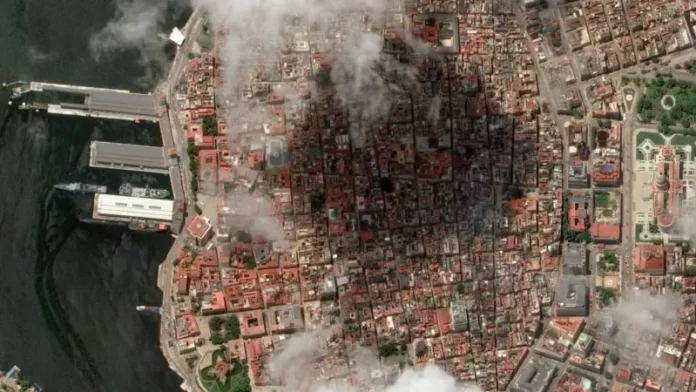Washington — New satellite images of Cuba have revealed potential links between the country and China, raising concerns about possible Chinese intelligence capabilities aimed at the United States. The images, presented in a report by the Center for Strategic and International Studies (CSIS), show signs of new or recent construction at four military bases in Cuba.
The imagery, taken in March and April, suggests that three sites near Havana and a previously unreported site near the U.S. naval base at Guantanamo Bay are being equipped with advanced technology for intelligence purposes. The report notes that Cuba does not have its own satellites or a space program, making these developments noteworthy.
One of the largest sites, Bejucal, was previously used to store nuclear weapons for the Soviet Union during the Cuban missile crisis in 1962. However, it has now gained prominence as a major signals intelligence monitoring station, suspected to be tracking electronic communications for China. The new satellite images show extensive updates, including a new electronic antenna enclosure.
Two other sites near Havana, Wajay and Calabazar, are also showing signs of growth, with analysts citing evidence of an expanding and evolving mission. This includes the installation of antennae, radar dishes and other equipment that could help monitor satellites. The fourth site, El Salao, appears to still be under construction, but its location and structures raise concerns about its potential use for intelligence activities.
The U.S. Office of the Director of National Intelligence declined to comment on the report. However, it follows a Wall Street Journal article from last year, which reported that China was investing several billion dollars in building a spy facility in Cuba. U.S. officials later confirmed that China had upgraded its intelligence facilities in the country in 2019, but that U.S. pushback had prevented Beijing from achieving its goals.
Pentagon press secretary Major General Pat Ryder, while briefing reporters on Tuesday, stated that the U.S. is confident in its ability to meet its security commitments. He also acknowledged that China will continue to try and enhance its presence in Cuba, but that the U.S. will work to disrupt those efforts. He added that the U.S. is closely monitoring the situation and taking steps to counter any potential threats.
Responding to a question from VOA, Ryder stated, “We know that [China] is going to continue to try to enhance its presence in Cuba, and we will continue to keep working to disrupt that.”
Meanwhile, China has rejected the findings of the CSIS report. In an email to VOA, the spokesperson of the Chinese Embassy in Washington, Liu Pengyu, called the report “nothing but slander.” He also accused the U.S. of continuously hyping up China’s establishment of spy bases and conducting surveillance activities in Cuba. Liu further stated that the U.S. should stop its “malicious smearing” of China, adding that the U.S. is the leading power in terms of eavesdropping and does not even spare its allies.
Cuba has also responded to the report, singling out a write-up in the Wall Street Journal. Deputy Foreign Minister Carlos Fernandez de Cossio posted on the social media platform X, stating that the article “seeks to scare the public with legends about Chinese military bases that do not exist and no one has seen.” He also questioned the validity of the claims made without any verifiable sources or evidence.
The CSIS report highlights the potential for China to gain important intelligence capabilities through these monitoring stations in Cuba. It states that Chinese access to these facilities would allow them to collect data on U.S. military activities, such as exercises, missile tests, and rocket launches. It could also help them monitor radio traffic and potentially intercept sensitive data from U.S. satellites passing over the southern United States.
In conclusion, the CSIS report raises concerns about the potential for Chinese intelligence activities in Cuba and their impact on U.S. national security. However, it also highlights the importance of continued monitoring and countermeasures to protect against any potential threats. As the U.S. continues to closely monitor the situation and take necessary precautions, the hope is to maintain a secure relationship with Cuba and to thwart any attempts by foreign powers to gather sensitive information.

